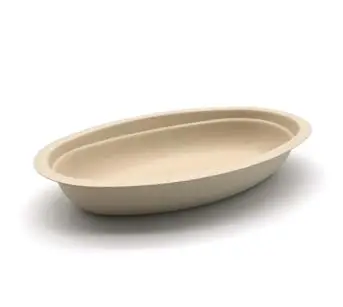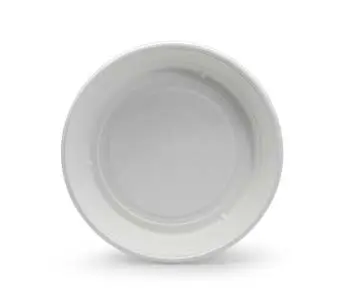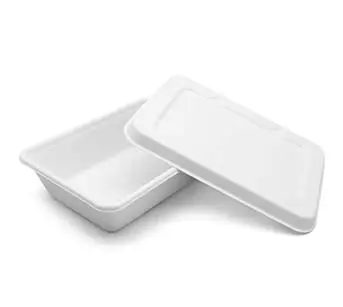Disposable soup bowls have become an integral part of our fast-paced modern lifestyle, offering convenience and practicality in various settings. These single-use bowls provide a simple solution for serving soup, whether it's for individuals on the go or businesses catering to a large crowd. Designed to be lightweight and easily disposable, these bowls eliminate the hassle of dishwashing and reduce the risk of breakage associated with traditional ceramic or glass bowls.
A Brief Overview of Disposable Soup Bowls
Disposable soup bowls are designed to provide a convenient way to enjoy soups without the need for cleanup. These bowls are typically made from materials like paper or plastic, ensuring their portability and durability.
They come in various sizes, but 8 oz disposable soup bowls have gained popularity due to their versatility and ideal portion size for individual servings. These compact-sized containers allow users to savor their favorite soups at home, in restaurants, or on the go.
The Importance of Using 8 oz Disposable Soup Bowls
The choice to utilize 8 oz disposable soup bowls stems from their remarkable benefits both for individuals and businesses alike. For individuals seeking convenience, these lightweight containers offer the perfect solution when enjoying takeout orders or arranging food delivery services. Moreover, during social events such as parties or picnics, these disposable soup bowls save time while still providing an elegant serving option.
Overview of 8 oz Disposable Soup Bowls
Description and dimensions of 8 oz disposable soup bowls
When it comes to food packaging, the size and design of the container play a crucial role in ensuring a satisfying and convenient dining experience. 8 oz disposable soup bowls are specifically crafted to hold a suitable portion of soup or other liquid-based dishes.
With an optimal capacity of 8 fluid ounces, these bowls strike a perfect balance, allowing for generous servings without overwhelming the consumer. The dimensions typically include a diameter of around 4 inches and a depth of approximately 2 inches, providing enough space for accommodating various types of soups or stews while still being comfortable to hold.
Common materials used in manufacturing these bowls
Manufacturers employ different materials when producing disposable soup bowls, each with its own set of advantages and considerations. One commonly used material is paper pulp, derived from renewable sources like recycled paper or virgin wood fibers. This choice offers sturdiness and rigidity while ensuring that the bowl remains lightweight and easy to handle.
Another option is plastic-based materials such as polypropylene (PP) or polystyrene (PS), which offer durability and excellent resistance to heat, making them suitable for microwave use. Plastic-based bowls often feature an insulating layer that helps keep contents hot without risking burns when handling the bowl.
Benefits of using disposable soup bowls
Disposable soup bowls serve as practical alternatives to traditional ceramic or glassware due to their numerous advantages. Firstly, these bowls provide unmatched convenience in both personal consumption settings as well as for businesses involved in food service operations. For individuals enjoying their soups at home or on-the-go, disposable options eliminate the need for washing dishes afterward, saving valuable time and effort.
Moreover, restaurants, food trucks, or catering services find these versatile containers invaluable for takeout orders, food delivery services, and even off-site events like picnics or outdoor parties. Additionally, the stackable design of disposable soup bowls allows for efficient storage and transportation, maximizing space usage while minimizing the risk of breakage during transit.
Convenience and Time-Saving Benefits for Both Individuals and Businesses
In today's fast-paced world, convenience is key, and 8 oz disposable soup bowls offer just that. Whether you are an individual ordering takeout or a business owner in the food industry, these bowls provide a hassle-free solution.
For individuals, these bowls are perfect for takeout orders or food delivery services. They enable you to enjoy your favorite soups or broths without the need to transfer them into separate containers.
This not only saves time but also reduces the risk of spills and messes. For businesses, such as restaurants or catering services, 8 oz disposable soup bowls prove invaluable when serving large quantities of soup at events like parties or weddings.
The compact size of these bowls allows for easy stacking, storing, and transportation. This means that your staff can efficiently prepare and pack orders without wasting valuable time searching for suitable containers or struggling with bulky traditional ceramic or glass bowls.
Ideal for Takeout Orders, Food Delivery Services, and Catering Events
When it comes to takeout orders and food delivery services, 8 oz disposable soup bowls shine as the perfect option. Their leak-resistant design ensures that liquids stay securely contained during transit.
Customers can enjoy their piping hot soup without any worries about spills ruining their meal experience. Catering events also benefit greatly from using these disposable soup bowls.
Whether it's a corporate lunch meeting or a grand wedding reception, the ease of serving becomes paramount. With pre-filled 8 oz disposable soup bowls ready to go, caterers can swiftly distribute individual portions without having to worry about plating up each serving individually on-site – saving valuable time in the process.
Easy to Stack, Store, and Transport Due to Their Compact Size
The compact size of 8 oz disposable soup bowls offers significant advantages in terms of storage and transportation. As they are designed to be stackable, these bowls take up minimal space.
This allows businesses to maximize their storage capacity without the need for additional shelves or excessive clutter. When it comes to transporting large quantities of soup, these bowls truly shine.
The stackable design enables catering companies or delivery drivers to optimize their space while minimizing the risk of breakage during transit. Additionally, the lightweight nature of these bowls makes them easy to handle and transport, reducing any strain on staff members.
Cost-Effective Solution for Businesses and Event Planning
The financial benefits of using 8 oz disposable soup bowls extend beyond convenience and time-saving factors. Businesses can significantly reduce costs by eliminating the need for dishwashing or hiring additional staff solely dedicated to cleaning dishes. Traditional ceramic or glass bowls often come with a higher risk of breakage, leading to added expenses associated with replacements.
In contrast, 8 oz disposable soup bowls are sturdy and durable enough to withstand regular use without incurring such costs regularly. Moreover, by opting for these cost-effective disposable options, businesses can allocate their resources more efficiently towards other essential aspects such as quality ingredients or improving customer service – resulting in a win-win situation all around.
Environmental Considerations
Discussion on the Environmental Impact of Disposable Products
One cannot overlook the environmental impact associated with disposable products, including 8 oz disposable soup bowls. Single-use items have become a major concern due to their contribution to waste accumulation and pollution. These products, including traditional plastic-based bowls, often end up in landfills where they take hundreds of years to decompose fully.
Moreover, the production and disposal processes emit greenhouse gases that contribute to climate change. It is crucial for us to understand these negative consequences and seek sustainable alternatives.
Challenges Posed by Single-Use Items
Single-use items pose significant challenges when it comes to waste management and resource depletion. The "use-and-throw" culture has led to mountains of non-biodegradable waste polluting our land and oceans. As such, it is essential for us to address these challenges by adopting more sustainable practices and materials.
Growing Awareness Towards Sustainability
Fortunately, there has been a widespread increase in awareness regarding sustainability issues associated with single-use items like disposable soup bowls. Individuals, businesses, and governments alike are awakening to the importance of reducing waste generation and choosing environmentally friendly alternatives. This growing awareness has paved the way for innovative solutions that minimize our ecological footprint while still providing convenient options for food service.
Alternatives to Traditional Plastic-Based Materials
To combat the environmental challenges posed by traditional plastic-based materials used in disposable soup bowls, various alternatives have emerged in recent years. These alternatives aim to reduce reliance on fossil fuels while maintaining functionality. Two prominent options include biodegradable bowls made from plant-based materials like sugarcane or bamboo fibers and compostable options that break down naturally without harming the environment.
Biodegradable Options Made from Plant-Based Materials like Sugarcane or Bamboo Fibers
Biodegradable soup bowls made from plant-based materials, such as sugarcane or bamboo fibers, offer a sustainable solution to the environmental impact caused by traditional plastic-based options. These materials are renewable and can be grown quickly without depleting natural resources excessively.
Moreover, they are biodegradable, meaning they break down naturally over time, reducing waste accumulation. Biodegradable bowls retain the necessary durability and heat resistance required for holding liquids without compromising on environmental responsibility.
Compostable Options that Break Down Naturally Without Harming the Environment
Compostable soup bowls provide another eco-friendly alternative to traditional plastic-based materials. Compostability refers to the ability of a product to decompose in composting systems. These bowls are typically made from bioplastics derived from cornstarch or other organic sources.
When disposed of in proper composting facilities, they break down into organic matter that enriches the soil instead of adding harmful waste to landfills or polluting water sources. Compostable options offer a closed-loop solution by returning nutrients back into nature.
Considering the environmental impact of disposable products like 8 oz disposable soup bowls is crucial for fostering sustainability. The challenges posed by single-use items have prompted a growing awareness towards finding alternatives that reduce waste generation and harm to our planet's ecosystems.
Biodegradable options made from plant-based materials like sugarcane or bamboo fibers provide durable yet sustainable choices, while compostable options offer a closed-loop solution where products return nutrients back into nature without causing harm. By embracing these alternatives, we can make strides in preserving our environment for future generations while still enjoying the convenience of disposable soup bowls.
Subtopics on Materials Used in Manufacturing Disposable Soup Bowls
Paper-based Bowls
Paper-based bowls are a popular option in the realm of disposable soup bowls, offering a sustainable alternative to plastic. Manufacturers typically use two types of paper for these bowls - recycled paper and virgin paper. Recycled paper is made from post-consumer waste, such as old newspapers or cardboard boxes, and it undergoes a process to remove any contaminants before being used for bowl production.
Virgin paper, on the other hand, is derived from fresh wood pulp that has not been previously processed. There are several advantages to using paper-based bowls.
Firstly, they are known for their sturdiness and durability, making them suitable for holding hot liquids without any risk of leakage. Additionally, these bowls can be easily recycled after use, reducing environmental impact and promoting sustainability.
However, it is important to note that one drawback of paper-based bowls is their limited heat resistance compared to plastic or foam options. Extreme temperatures may cause them to soften or deform if not properly insulated.
Plastic-based Bowls
Plastic-based bowls are commonly manufactured using polypropylene (PP) or polystyrene (PS). Polypropylene is a versatile thermoplastic polymer known for its excellent heat resistance and durability. It provides sturdy and reliable properties that make it suitable for holding both hot and cold soups without compromising the structure of the bowl itself.
Polystyrene is another popular plastic used in disposable soup bowl production due to its cost-effectiveness and lightweight nature. Although it offers good insulation properties that help maintain the temperature of the soup inside, polystyrene lacks the same level of durability as polypropylene.
Both types of plastics have their own set of advantages when it comes to disposable soup bowls. They are generally more affordable compared to other materials used in manufacturing, making them an economical option for businesses.
Additionally, plastic bowls are lightweight and easy to transport, perfect for takeaway or delivery services. However, it is important to consider the environmental impact of plastic-based bowls and explore options that are more sustainable and eco-friendly.
Conclusion
In the realm of disposable soup bowls, materials play a crucial role in determining their functionality and environmental impact. Paper-based bowls offer a sustainable choice, utilizing recycled or virgin paper to provide sturdy and recyclable options. On the other hand, plastic-based bowls made from polypropylene or polystyrene offer excellent heat resistance and affordability but may fall short in terms of sustainability.
As consumer awareness towards eco-friendly solutions grows, it becomes essential for manufacturers to innovate and develop alternative materials that can offer both convenience and environmental responsibility. By embracing such alternatives or encouraging recycling initiatives, we can gradually reduce the ecological footprint while still enjoying the convenience of 8 oz disposable soup bowls.




